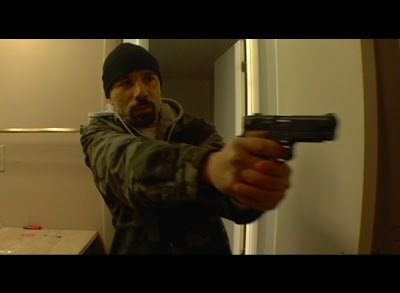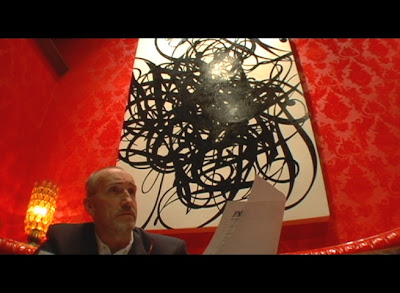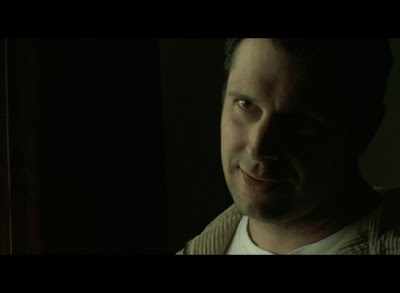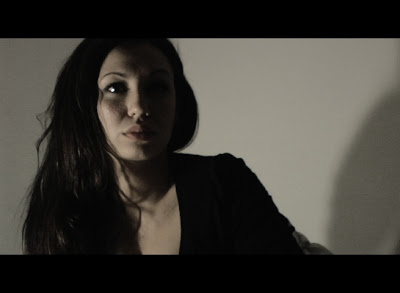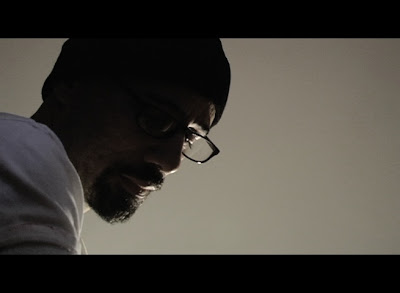And I’m far from alone in this view, considering 1903's The Great Train Robbery which is often cited the first narrative feature with parallel action in cinematic history that has furthermore been preserved and registered as a national treasure by Washington D.C.'s Library of Congress. In fact, arguably Edwin S. Porter’s twelve minute short that famously included history’s first close-up (which projectionists could insert either as an opening or closing shot) of a gun being fired directly at the audience began our country’s love affair with playing cops and robbers as adults on film instead of as children in the backyard.
From James Cagney yelling he's "on top of the world, ma" in White Heat to Arthur Penn's Bonnie and Clyde or Quentin Tarantino joking that he would've actually shot Reservoir Dogs in his own backyard with friends, the crime film has taken on many different forms in more than a century of its popularity.
Yet at their core, most do involve as Godard noted "a girl and a gun" along with the requisite good guys or bad guys some with white and black hats (in westerns) and others where it isn't so clear. And despite the fact that it's still perhaps the most popular genre in which to work, both independent filmmakers and pros know that you have to do something different to set your film apart from the pack. This has been achieved by way of an unreliable narrator (The Usual Suspects) to constant switching of point-of-views (Go), or reversing the chronology like Christopher Nolan's Memento along with countless attempts to throw the audience off balance.
And as first time feature filmmaker David C. Snyder explained to Jeff Niesel, that the idea of telling a straightforward story from beginning to end is "not that interesting" at least when it comes to the type of crime film he wanted to make in a point in time where kidnap and ransom films have become incredibly commonplace. Using a few of the aforementioned techniques including changing perspective by dividing it "in sections, so that you see the same event... over a certain period of time and reveal information gradually," Synder embarked on an incredibly ambitious challenge for a newcomer to try and maximize the surprise factor.
And the resulting work, The Quiet Arrangement, is currently making the rounds on the film festival circuit after "playing to packed houses in Cleveland." While Snyder's film is actually too ambitious for its own good and suffers because of it, his confidence as a storyteller and obviously deep understanding of the far too many characters involved help keeps viewers invested throughout even if it takes awhile to differentiate between some that could've been dropped altogether. Honestly, that's a feeling that pervades throughout the otherwise capable work. For although it clocks in at a modest 107 minutes, I strongly believe that Snyder's Arrangement may have been far more solid as an intense and tightly edited picture if even 25 minutes would've been chopped off the running time to maximize Snyder's incredibly complex setup and wide variety of characters.
As a writer/director who'd created a jam-packed script, Snyder has a lot of great stuff from which to choose as soon as the opening ten minutes introduces us to the situation. The film centers on shady lawyer Walter Briggs (Kevin M. Hayes) who enters his upper middle class home only to receive a phone call, package, DVD and demand that he's to deliver a million dollars by ten a.m. the next day to ensure the safe return of his wife Sharon (Christina Simkovich) who's been kidnapped. Despite the fact that Walter tries insisting he doesn't have such a large sum, we get the sense that this crime is being perpetrated by those who know the man well when they correct him on his lie about the funds. Thinking the same way, Walter begins visiting some of his more ruthless drug dealing clients-- loaded gun in hand-- which quickly reveals he's somehow tied to people far more dangerous than the two he accuses initially.
Since Snyder's film occurs roughly over the course of one very long day, the four sections of the piece move from different key points in it as we're introduced to two different criminals working the kidnapping such as the sleazy, detached Mr. Parks (John Delserone) and the obligatory sensitive villain, Mr. Fields (Kyle Jason) who's guarding the hostage and begins bonding with her almost from the start. Continuously addressing each other with Mr. or Mrs., the film takes on a Reservoir Dogs style ("Mr. Pink, Mr. Orange") immediately although it's one that Snyder abandons for the third section of the film involving two undercover cops who are somehow linked to the rest of the criminal mess.
While this would've been a terrific point in the film to hurl an unexpected curveball into the plot, it's never utilized as Quiet Arrangement suddenly begins to ignore the outfield altogether and bunt its way towards overly long extra innings. For, ironically, once we've left the untrustworthy Walter and scummy Mr. Parks behind, the last half of the film which deals with more likable characters is bogged down by unrealistic situations comprised of far too much talk and not enough action. Although they do indeed provide another angle and setting for the film, the chatty and surprisingly unassertive cops feel inauthentic and the last act with Mr. Fields and Sharon Briggs should've made the most of the Red Rock West meets French Connection 2 ingredients but it drowns in impromptu speeches, apologies, and the tendency to say everything instead of showing any of it.
Admittedly, no doubt Snyder was limited in budget, resources, and access to the caliber of talent that would've strengthened some of the sequences considerably along with again much sharper editing to try and whittle away some of the static events in the monologue-heavy conclusion. While all of the discussion right down to the talking killers of the last ones standing may have worked much better on the stage and helped bring us all up to speed given Snyder's complicated plot, for a film, it bring the scenes to a standstill, especially where actress Christina Simkovich's Sharon Briggs is concerned. Luckily Kyle Jason's interesting presence helps balance out the problems regarding his scene partner and likewise Snyder does pull a few neat tricks in the ending as two characters continuously miss one another by seconds without fully registering their connection in the final sequences that gets us back into the film.
Working in one of the most popular genres where "everything's been done before," Snyder was definitely brave in his decision to try and present what could've been an ordinary situation in an unorthodox way as the points-of-view move around to show where the main players were at the most critical moments and what each of their motivations were. However, a few rewrites, one crucial recast, and more cuts would've helped make the film far less Quiet in the long run. Yet there's enough there to show a strong promise for the writer/director including his genuine knack for storytelling that I'm confident the next feature will expand upon since failing to see his talent would be a crime indeed.
Text ©2009, Film Intuition, LLC; All Rights Reserved. http://www.filmintuition.com
Unauthorized Reproduction or Publication Elsewhere is Strictly Prohibited.

